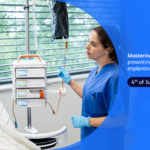PICC, port or Hickman? Make the right choice in oncology
“I think that the biggest issue in our service is choosing which device for which patients,” said Professor Caren Randon, MD, PhD, Head of Service of the Department of Thoracic and Vascular Surgery at the Ghent University Hospital and Fellow of the European Board of Vascular Surgery (FEBVS).1 Many hospitals, such as the Ghent University Hospital in Belgium, base their decision on a flow chart that guides nurses to the correct choice of central venous access device (CVAD) depending on the patient’s treatment needs.
Professor Randon reviewed their hospital’s flow chart against the most recent literature to understand if their process for device choice required updating.1 Read on to discover Professor Randon’s findings from her lecture at the 2022 BD Multidisciplinary Advanced Course on Vascular Access (MACOVA).
PICC lines, Hickman lines or implanted ports?
Professor Randon evaluated 10 studies to compare the complication risks of the three main types of CVADs in oncology: peripherally inserted central catheters (PICC lines), subcutaneously tunneled central catheters (Hickman lines) and implanted ports.1 The literature included systematic reviews, randomised controlled trials, prospective studies and meta-analyses comparing CVADs in the delivery of systemic anticancer therapy.
When compared to implanted ports, the majority of the literature reported that PICC lines were associated with a higher risk of complications, including thrombosis, occlusion, infection, malposition and accidental removal.2-5 In fact, based on the Surface Under the Cumulative Ranking (SUCRA) curve method, one systematic review found that PICC lines had the highest probability of complications, followed by Hickman lines and implanted ports respectively.6
Learn more about the comparison of implanted ports and PICC lines: PICC line or port catheter: Which one for cancer patients?
The CAVA trial: Comparing central venous access devices
Professor Randon highlighted a recent randomised controlled trial from the NHS known as the CAVA trial, in which 1061 adult patients requiring systemic anticancer therapy for 12 or more weeks were observed to compare complication rates and costs between implanted ports, Hickman and PICC lines.3
Become a VAMbassador to get access to the full article




